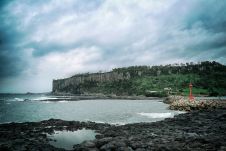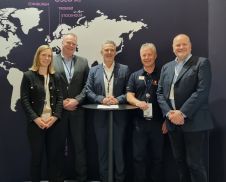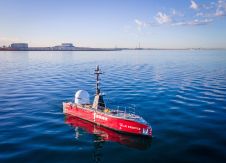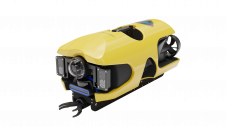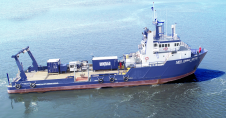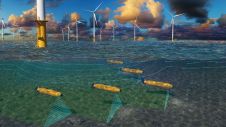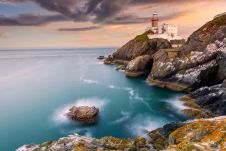The Romantic Profession
Hydro International Interviews Rear-Admiral (ret.) Alexander Ivanovich Sorokin
This month’s interviewee has over recent years dedicated his time to addressing problems in oceanography, as well as history and the contemporary state of high-level training for specialist hydrographers. He initiated the development of international models for standard and reference oceanospheres. Rear-Admiral Sorokin is author of books on English-American terminology, including an English-Russian dictionary of navigation, hydrography and oceanography (with Mrs G.V. Tributs). This has offered a greatly enhanced opportunity for Russian hydrographers to familiarise themselves with international achievements in these areas.
As author of an English-Russian dictionary of navigation, hydrography and oceanography are you familiar with the difficulties in communication that result from differences in training and professional background?
The main difficulty in translating from English to Russian and back consists in the polysemanticity of professional terms. For example, a Russian word in different cases may be translated as running, travel, train, way, motion, variation, stroke, turn, thread (screw thread: ) etc. Additional work arises from a number of synonyms in English. For example, the term “isobath” (in Russian, ) has synonyms such as hydroisohypse, bathymetric contour, contour line, depth counter, sea counter, and depth curve in English technical and training literature. Some words have no equivalent terms in another language and demand the invention of new ones. For example, for one of the meanings of the term “routing” a new Russian wordwas suggested. Of course, differences in training and professional background also add to difficulties in communication, but to a lesser degree.
The combined use of GPS and Glonass and, in future, Galileo should lead to an improved navigation system based on satellites (GNSS). Do you think the difficulties in communication also apply to product development for products using differentiated technology such as GPS and Glonass and, if so, what do you suggest might improve the relevant research?
As GPS and Glonass are different and independent satellite systems, their technological development can also proceed independently. Difficulties may arise should the receivers be modernised. It’s obvious that there should be constant contact and consultations between researchers and engineers working on the development of the respective satellite systems, and the researchers and engineers working at the receiver side.
What do you expect from the development of Galileo?
The space system Galileo will be primarily developed to make European countries independent of the decisions made by countries that own GPS and Glonass. Of course, the development of Galileo will increase reliability and accuracy of positioning systems. However, new types of receivers that are compatible with all space systems have to be constructed. Creating universal coordinate and time systems will be very useful for the community.
What are your expectations regarding the development of the Glonass network and services?
The main shortcoming of the Glonass network is a rather short longitudinal length of station placement. For an increase in accuracy it is necessary to increase the quantity of control stations along the whole satellite spaceway. I think that placing stations in friendly nations and on special oceanic platforms is necessary to improve accuracy.
Do Russian hydrographers have a unique speciality or professional focus, acquired during their training or otherwise?
Russian hydrographers are trained with a broad scope. They can be appointed to posts in a broad range of organisations, from navigation equipment services to oceanographic expeditions. Postgraduate courses, for example in the Naval Academy, will help them to acquire specialisation such as gravimetrist, radiogeodesist, hydrologist or cartographer. The specialist professionals whose work involves conducting mainly routine hydrographic tasks such as echo-sounding and hydrographic sweeping are called “pure hydrographers”, with some deal of contempt. Some hydrographers serve in the navy or work in diplomatic services and otherwise. For example, ex-premier of the Russian government Eugeny Primakov was educated as a hydrographer.
In the late 1950s and early 1960s you were involved in early research on drifting ice in the Arctic Ocean. Given global warming, this research is still important. What kind of developments in ice research do you expect to accompany developments in hydrography?
The ice research for decision-making relating to the problem of global warming is now more important than in the 1950s and 1960s. Russian polar stations have successfully prolonged investigations carried out over recent years. Besides routine measuring of ice qualities such as thickness, strength and stratification, ice spreading dynamics are permanently monitored. This monitoring is carried out with the help of modern research means, including “cryosats” satellites.
What is your view on the worldwide shortage of hydrographic staff?
I think that the volume of oceanographic work will only increase in the future and that shortage of hydrographic staff will increase as well. The specialised training carried out in different countries should be co-ordinated on a worldwide scale. For example, the Russian Naval Academy in St Petersburg has good experience in training highly qualified hydrographers for many countries in Europe, Asia and Africa.
Do Russian hydrographers easily find employment?
Thanks to the increase in hydrographic work, especially due to laying gas pipelines on the sea bottom, Russian hydrographers currently have a good chance of finding employment even whilst they are still undergoing training in institutes and marine schools. During the Soviet period Russian military hydrographers had a good chance of finding suitable work in oceanographic expeditions, scientific institutes and naval schools even after retirement. This was mainly thanks to their broad education and training in the Soviet period. In the later economic crisis they had to look for casual work outside hydrography. We hope that these temporary circumstances will end in the near future.
Can you please explain the organisational structure of hydrographic research in Russia?
In the Soviet Union oceanographic research was structured in relation to five data centres. Each centre was focused on a different object of research: hydrology, hydrography, meteorology, geology, geophysics and hydrobiology, and each was responsible for gathering oceanographic elements. One of the centres played the role of the International Data Centre B, in a similar way to the Centre A in the USA. The Naval Oceanographic Research Centre gathered complex information. Nowadays oceanographic expeditions in Russia are carried out by many organisations, particularly by the Hydro-meteorological Service, the Academy of Science, and the Navy. However, it should be noted that in recent years oceanographic research has been significantly reduced due to lack of finance.
What kind of educational institution do you have in Russia; are they linked to the Russian Navy or are they privately run?
It is possible to get trained in oceanography at an establishment for higher and secondary education, such as universities, institutes and naval schools. Private institutes for this type of education do not, as far as I am aware, exist in our country.
In the reply to an earlier question you mentioned that the Russian Naval Academy in St Petersburg had good experience in training highly qualified hydrographers for many countries. Is this the result of collaboration networks and does the Naval Academy provide commercial courses?
The Naval Academy trains oceanographers for friendly nations on a commercial basis.
Hydro international appears in the English language, but our scope is global. Is this journal broadly read in Russia, and are there comparable journals there?
I know that members of the Russian Hydrographic Society, including myself, regularly read this magazine with great interest and pleasure. I am not aware of the existence of a similar magazine in Russia.
Do you have a message for our readers?
I am grateful for the opportunity to greet my colleagues, hydrographers, readers of this remarkable magazine, and to congratulate them on the International Day of Hydrography (21st June). I particularly want to wish all the best to young specialists who have decided to commit their life to the romantic profession directed at the study and development of the world’s oceans.

Value staying current with hydrography?
Stay on the map with our expertly curated newsletters.
We provide educational insights, industry updates, and inspiring stories from the world of hydrography to help you learn, grow, and navigate your field with confidence. Don't miss out - subscribe today and ensure you're always informed, educated, and inspired by the latest in hydrographic technology and research.
Choose your newsletter(s)












